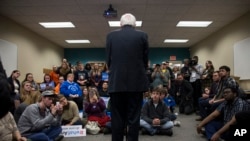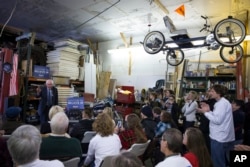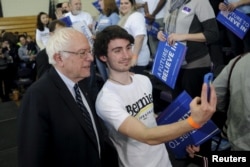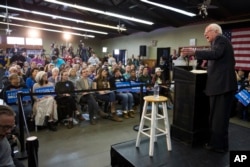On the presidential campaign trail, Vermont Senator Bernie Sanders often points to Scandinavian countries, including Denmark, as models of his self-proclaimed "democratic socialist" policies, such as free college tuition and a system of universal, single-payer health care.
The Democratic candidate's costly proposals draw criticism from many conservatives, who have long used the phrase “socialism” as a political smear. Yet in a recent poll by the state's biggest newspaper, more likely Democratic caucus voters see themselves as socialist than capitalist.
It would seem unlikely many people who live in Elk Horn, Iowa, would associate themselves with "socialism."
At first glance, this tiny farming community in the upper Midwest appears as rock-solid conservative as most small Iowa towns that leaned toward the Republican Party in past elections. A 90-minute drive west of Des Moines, and well off any major highway, this town of 662 people is almost completely white, according to census data. And most of its residents are either Catholic or Protestant Christians.
But a closer look reveals surprising hints of liberal societal values. In a city with a total area of less than two square kilometers, and not a single grocery store, there are no fewer than eight electric car recharging stations — not a common sight in the countryside.
Solar panels sit atop many local businesses. The city has finely maintained recreational trails complete with an outdoor public fitness center. Officials are even working on creating a system of bicycle routes.
If Elk Horn seems vaguely European, it’s probably no coincidence. In fact, that may be a reflection of the city’s distant past: The area was settled in the mid-19th century by immigrants from Denmark.
Decades later, many of its residents still hold tightly to their heritage. Restaurants here serve traditional dishes from the “old country,” including flæskesteg (a traditional roasted pork), frikadeller (meatballs) and aebleskiver (something like a ball-shaped pancake).
‘We’re Americans, but we’re Danish’
At the center of town stands an 18-meter-tall Danish windmill, towering over every other structure in Elk Horn. Brought over from Denmark in 1976, the windmill now serves as a gift shop and visitors welcome center. But the city’s Danish heritage is more than just a tourist attraction, according to local residents.
“There’s an attitude that, yes, we’re Americans, but we’re Danish, too,” according to Bob Mortensen, a longtime Elk Horn resident who retired after working 30 years as a railroad track inspector. “We still have family back in Denmark. We still have a certain tie to Denmark.”
According to Mortensen, those decades-old ties affect the way he and others in the area think about politics, and in Elk Horn, some people see Sanders’ socialist policies in a more positive light. Mortensen supports Sanders, who is attracting a surprisingly large amount of support in the Hawkeye State and is locked in a virtual tie with his more conservative Democratic rival, former Secretary of State Hillary Clinton.
“To a lot of people, what Bernie Sanders is suggesting is a completely foreign idea,” Mortensen said. “Whereas to Scandinavians, this is something that in the old country, it’s been this way for a while.”
Sanders is even attracting support from some here who have traditionally been on the conservative side of the U.S. political spectrum.
“This is probably going to sound weird,” said James Uren, owner of the Village Cafe along the main route through town. “But as a card-carrying Republican, I am probably leaning toward Bernie Sanders, believe it or not. I just think some things need to be done differently in our country, and I would really like to see us take care of people within our own country before we start expanding out.”
Ties to past?
Drawing a direct link between a community’s distant ethnic ties and its present-day voting patterns is controversial. Many Iowans with Scandinavian heritage, of course, see no link at all to their political preference.
“Scandinavian heritage is a part of who we are, but I haven’t seen much evidence that it directly ties to politics in that way,” said David Peterson, a professor of political science at Iowa State University in Ames. “I don’t like speculating too hard beyond what I have data for, and I haven’t seen anything that suggests that.”
But Colin Woodard, an expert on the distinct ethnic regional cultures spread across the U.S., said he wouldn’t be surprised if those with Western European roots still held on to some of the political or social views of their homelands, even all these years later.
“It’s entirely possible,” Woodard said. His research has established links between local ethnic groups and political behavior decades later.
"It can change over time, but it can change rather slowly and can account for the big differences between voting habits of two communities,” said Woodard, pointing to people in the upper Midwest who support left-wing politics. “In a lot of that stretch of the Midwest, many of the early settlers were Germans who were fleeing the failed 1848 revolutions, which were essentially a sort of a leftist/socialist revolution that failed in imperial Germany.”
Those kinds of views could be passed down from generation to generation, Woodard said, making the area “more conducive to social democracy than in many other parts of the country.”
Des Moines Register poll
But is Iowa really full of left-wing voters who see themselves as democratic socialists? Some evidence to support such a claim is found in a Des Moines Register poll this month, in which 43 percent of Democrats who plan to participate in Monday’s Iowa caucuses identified themselves as “socialist.” That’s more than the 38 percent of respondents who called themselves “capitalist.”
The poll may help explain why the fiercely liberal Sanders is popular across Iowa, despite the state’s reputation for having traditional, conservative Midwestern values.
Steve King, a Republican U.S. congressman from the 4th District of Iowa and a frequent critic of what he sees as socialist policies, told VOA he saw no reason to doubt the Register poll.
“I think that it’s probably true," he said. "We shall see. If Bernie gets 43 percent [in Iowa], that would be logical. It’s a really sad thought, but I don’t doubt it.”
Questions about poll
But there are plenty of reasons to be skeptical of the poll’s findings, too.
Peterson, the Iowa State professor, suggested the survey might reflect only a temporary trend. Many of the respondents may have intended only to show their support for Sanders’ candidacy, not socialism, he said.
“I would guess that a good portion of that is, ‘Are you sympathetic towards Sanders?’ or ‘Do you identify yourself as a Sanders supporter?’ ‘Are you feeling the Bern?’ ” he said.
Still, there is no denying that Sanders has many passionate supporters in Iowa. Rania Batrice, the communications director for Sanders' Iowa campaign, said it’s clear that Iowans are not scared of the phrase “democratic socialism.” But she said his popularity here has more to do with everyday factors.
“Bernie’s message of economic inequality and making college affordable for everyone, raising the minimum wage, pay equality — these are messages that resonate,” she told VOA. “Iowa is predominantly working class, and I think that’s one of the reasons that the senator’s message has resonated so greatly, is that he is talking to people about issues that affect their everyday lives.”
More mainstream?
Sanders’ populist message also helps explain why he is appealing to such a diverse group of voters across the nation, according to Richard Wolff, an economics professor at the University of Massachusetts at Amherst.
“Something is going on in the United States that all of this is tapping into,” said Wolff, who also pointed to the recent Occupy Wall Street protests. “You’d have to be very strange not to see that. And I think Mr. Sanders is the next wave.
"The last 50 years, at least, the Cold War made words like socialism so bad, so negative, so off the wall, so associated with a horrible foreign country — every kind of negative association you could imagine.
“Now that period of history has come to an end. The Cold War is over. And the capitalism, which presented itself as the great victor in the capitalism versus socialism sweepstakes, is clearly having some serious troubles of its own.”
If the success of the Sanders campaign does mean left-wing politics are becoming more mainstream, then that wave could start in Iowa, with voters like Bob Mortensen, the Elk Horn resident, who is caucusing for Sanders on Monday night.
Would he have have told the Register pollster that he identifies as a socialist?
“Yeah, I suppose I would, because I understand what the true meaning of that label is," he said. “I am a Christian. I am a socialist. And part of the reason I am a socialist, by the true definition of that word, is because I am a Christian."







